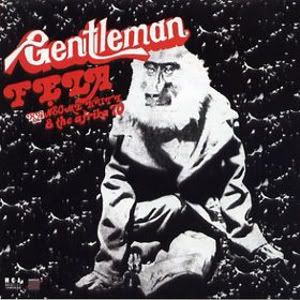 So, I was watching the Presidential Debate on Friday and I couldn't get Fela Kuti out of my head. It actually started about an hour before showtime, when I raced out of the office to get some dinner and a six pack of Red Stripe at the grocery store before the debate began and "Sorrow, Tears, and Blood" spontaneous starting playing in my mind. It is one of my favorite Fela songs ever and its political message surely played a part in getting it stuck in my head to begin with.
So, I was watching the Presidential Debate on Friday and I couldn't get Fela Kuti out of my head. It actually started about an hour before showtime, when I raced out of the office to get some dinner and a six pack of Red Stripe at the grocery store before the debate began and "Sorrow, Tears, and Blood" spontaneous starting playing in my mind. It is one of my favorite Fela songs ever and its political message surely played a part in getting it stuck in my head to begin with.While it is certainly somewhat analogous to the current draconian presidential administration, it would be quite a stretch to draw too close of a comparison between the oppressive military dictatorship of Fela's Nigeria to the George W. Bush era, but the song did get me thinking about Fela's message of unity and how it parallels to Barack Obama. Basically, Fela Kuti found an audience by connecting with people traditionally on the margins of society who felt the power establishment would never listen to their voice. When you look at the millions of young, first time and historically apathetic voters who form the backbone of the Obama phenomenon, it's easy to draw comparisons.
Anyway, as I watched John McCain do his best to represent the interests of the elite classes (yes, his wife is worth $100 million and he's been part of a "broken" Washington government for 26 years) while cloaked in this absurd notion that he's a "reformer", I realized that power establishments never fall until public sentiment reaches a breaking point. In a dictatorship the will of the public usually manifests itself in the form of revolution, but in America the revolutions come at the ballot box. As America stands on the verge of becoming a majority minority country, a realignment of political power is almost a certainty. It may not happen on November 4th, but a change is coming and usually it requires a transcendent figure to lead the change.
Which brings me to "Gentleman." While the Fela catalog is peppered with songs about political unity, struggle and revolt, many of them are either too sad ("Sorrow, Tears and Blood", for one) or too dramatic ("Coffin for Head of State" comes to mind) to make the Obama connection, so I decided to go with one that is kind of light and upbeat (for Fela, that is). "Gentleman" achieves this by describing how one needs to act in order to stand up in the face of corrupt power. Throughout the song he declares "I no be gentleman at all/I be Africa, man/original", as if to say the traditional means of attaining political change no longer apply. In fact, he goes on to assert that real change won't come until "somebody come bring original trouble."
Now, Obama may be more of gentleman than Fela would've liked, but he is African and certainly an original. You could also make the argument that his movement has brought its share of "original trouble" in that it shook up the electoral process by awakening a silent majority of people who were waiting for someone to come along and give voice to their political frustrations. In barely over a month we should find out if that formerly sleeping giant is enough to knock down the traditional power monopoly, or if it needs a little more time to grow.
Fela Kuti & Africa 70 - "Gentleman"



No comments:
Post a Comment